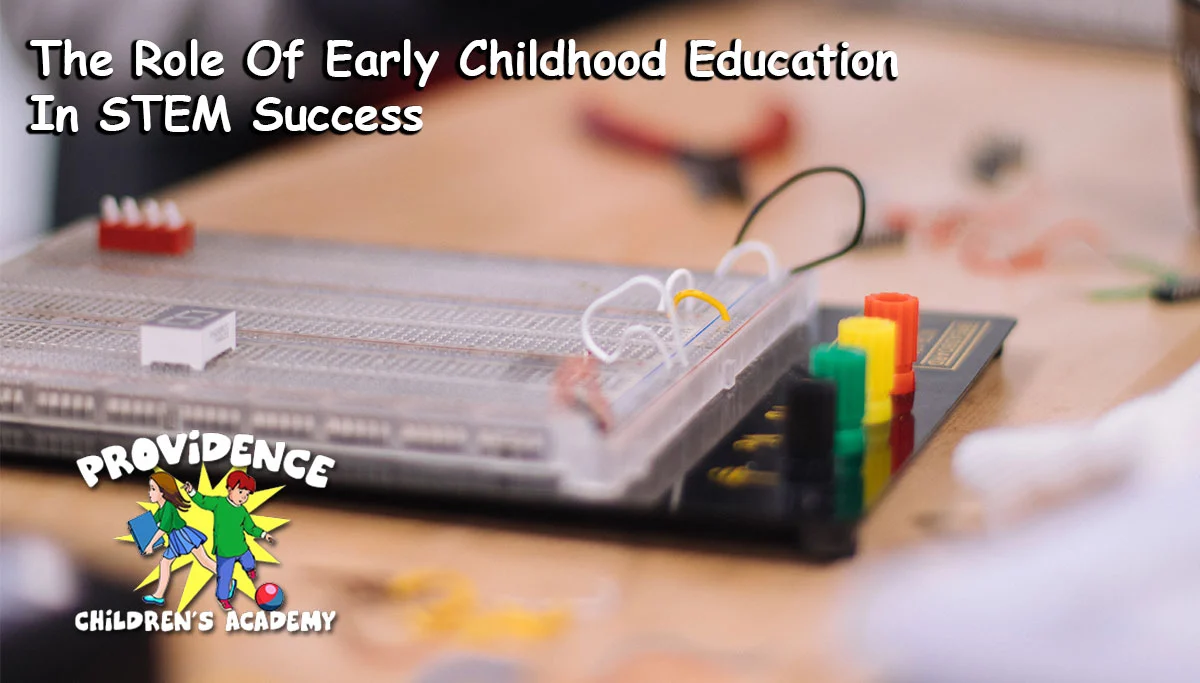
In a rapidly evolving and increasingly technology-driven world, the importance of STEM – Science, Technology, Engineering, and Mathematics – cannot be overstated. In recent years, the study and development of STEM skills have become a national priority, with more and more emphasis being placed on helping children develop the understanding necessary to tackle deeper STEM topics further down their educational careers.
But how does early childhood education impact future STEM success?
Below, we delve into the details of a groundbreaking study that highlights the impact of high-quality childcare on future STEM success. Titled “Quality of Early Childcare and Education Predicts High School STEM Achievement for Students From Low-Income Backgrounds,” this study highlights the importance of high-quality early childcare and individual attention for young minds.
The Link Between Early Childcare and Future STEM Success

The study was published by the American Psychological Association (APA) and headed by Dr. Andres S. Bustamante. In the study, you find a direct relationship between early caregiving and future success in STEM fields – and it’s not necessarily about STEM activities.
Dr. Bustamante found that nurturing environments where the caregiver displayed sensitivity and responsiveness to the child were a strong predictor of later STEM outcomes. In essence, the quality of care and the level of available attention were as (if not more) important than activities directly related to STEM fields.
High-quality early education, like the programs and curriculum we run at Providence Children’s Academy, arm your child with the confidence and security they need to thrive within STEM settings. The cognitive, emotional, and social development that happens during early education serves to support the curiosity and enthusiasm required in STEM.
The point the study makes is that STEM success is built on a foundation of human connection. When a child feels supported, when they believe they’re fundamentally interesting, when they’re shown their questions are valuable — they become cocooned in a level of confidence that failed science experiments and tricky mathematics equations can’t shake.
By engaging with young minds and permitting them to be curious, they’re set up to succeed throughout their professional lives.
At Providence, we’ve fostered a truly special environment that gives children a safe place to ask questions, learn, and thrive. Whether they’re collaborating in a group activity or working on a solo project, your child experiences the synergy that arises when social and emotional development is valued as strongly as cognitive growth.
We also believe in teaching children how to encourage not only their peers, but also themselves. By modeling positive self-talk, we set children up for a lifetime of gracious experimentation and imbue them with an eagerness to try new things. Once a child falls in love with the process of learning, they’re set up for a lifetime of STEM success.
Why STEM Matters
STEM is everywhere. It answers thousands of questions that occur to a child throughout their days, fueling their curiosity and encouraging them to seek out new experiences so they can learn from them.
It has an explanation for why wearing a jacket makes you feel warm. It has an explanation for why it’s difficult to cut a pie into 7 slices. It has an explanation for why we’re able to change the volume of a speaker, why every rainbow has the same set of colors, and why most flowers grow in Spring.
Without STEM in the modern world, we wouldn’t have electricity, radio stations, skyscrapers, life-changing preservatives that keep food safe to eat for longer, money to trade for goods and services, and so much more. And without an understanding of STEM principles, you’re cut off from a lifetime of learning.
The impact of a good preschool curriculum on academic success can’t be ignored. Nurturing an inherent appreciation for STEM at a young age is important because it lays the foundation for later learning.
Other Ways to Support Future STEM Success

Research in the early 2000s identified that children’s science learning relied on a foundation of early childhood enthusiasm, interest, and experience. And, according to the National Science Teachers Association, that experience can (and should) be built from as early as preschool.
Providence Children’s Academy has been a strong advocate of STEM activities for many years, and recent research further supports the importance of this knowledge base and its associated skill sets.
STEM Activities for Preschoolers
The best STEM activities explore the interactions between the four disciplines and link these interactions to the real world. They promote critical thinking and problem-solving, and they teach children about the importance of persevering.
A few years ago, we created a list of summer-themed STEM activities. If you’re looking to build even more curiosity in your child, here are some new STEM activities for preschoolers that you can try at home with your little one:
Magic Milk
A firm STEM favorite, this activity teaches children about the different ways liquids interact with each other. To make magic milk, you’ll need a bowl of milk, food coloring, dish soap, and cotton swabs.
Place dots of food coloring into the bowl of milk without stirring. Dip a cotton swab in the dish soap and then into the bowl of milk. The result is a swirling, jumping, colorful chemical reaction as the dish soap tries to attach to the fat within the milk.
This activity teaches your child about surface tension. The dots of food coloring remain relatively stable because of the surface tension of the milk. Introducing dish soap (which tries to bond with the fat molecules in milk) disrupts the surface tension and causes the dots of food coloring to spread around.
Apple Boat
To make an apple boat, you’ll need an apple, a wooden skewer, a piece of firm paper, and some glue. Start by cutting the apple in half, then insert the skewer into the center of the cut side of the apple. To make the sail, cut a rectangle out of the piece of firm paper, fold it in half lengthways, and glue the two halves together around the skewer.
Place the apple boat in a bucket of water, pool, or in the bath to watch it float and bob. You can take turns blowing into the sail and watching how the apple boat moves in response to your breathing.
This activity teaches your child about buoyancy, the ability of an object to float, and about air resistance. In the adult world, buoyancy is useful for ships, swimming, and even submarines. Air resistance powers windmills to create electricity, and it affects the speed of cars and airplanes.
Flower Dissection
Go on a walk around your garden or a nearby park with your child and collect a few flowers. When you get home, let them pull the flower apart (or cut it using a pair of safety scissors) into the following different sections:
- Petals
- Pistil (the center of the flower)
- Leaves
- Stem
- Roots
Breaking a flower into its different sections is the foundation of botany, the study of plants.
Unparalleled Early Childhood Education with Providence Children’s Academy
At Providence Children’s Academy, high-quality early childhood education is synonymous with good early STEM learning. We believe that for children to thrive further in their school career, they need to have nurturing early education providers and an introduction to age-appropriate STEM principles from a preschool level.
If you’re looking for an interactive, encouraging, and nurturing preschool for your little one, why not view Providence Children Academy’s Virtual Tour to see if we’d be the right match? With years of experience providing top-quality early education, we know how to encourage a love of learning within children that carries them through high school and beyond.
